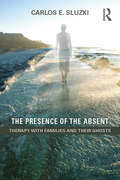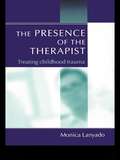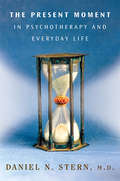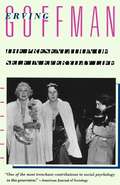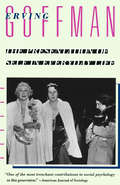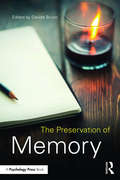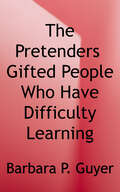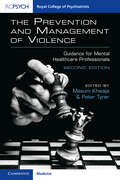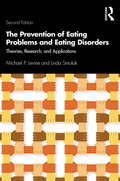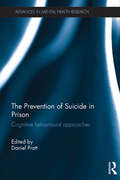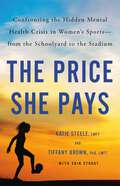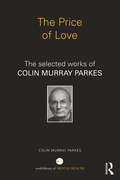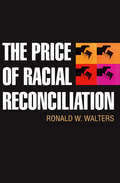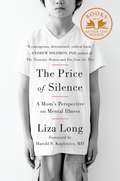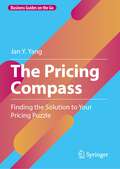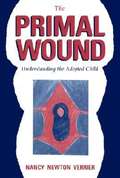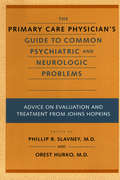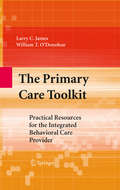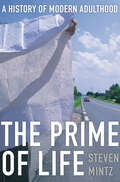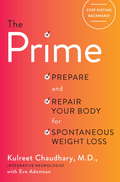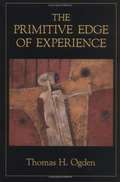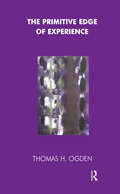- Table View
- List View
The Presence of the Absent: Therapy with Families and their Ghosts
by Carlos E. SluzkiWhere live our most cherished (or painful) memories? Where do our beloved (or dreaded) exist when departed? In the gray zone between our self and our world, they can exist as internal reminiscences for some and striking images for others; individually or collectively perceived and interacted; vividly or as tenuous presences.This book familiarizes us with six examples of individuals and families in therapy who live and interact with the presence of their absent, pivotal people in their lives who either died or disappeared, but are still there. It familiarizes us with their plight in a tender, compassionate style, describing in detail interviews and therapeutic transformations and, in several cases, follow-ups as well as echoes of those processes. It teaches us to respect those presences as well as how to help families and individuals treasure them…and in many cases to let them go.Written in a vivid, intense language, The Presence of the Absent offers a marvelous insight into these processes that may prove transformative for the therapist (both family and individually-oriented), as well as enlightening to the general public.
The Presence of the Therapist: Treating Childhood Trauma
by Monica LanyadoThe Presence of the Therapist uses clinical studies based on the author's publications over the past 18 years to illustrate work with severely distressed children. The reader is encouraged to enter a dialogue with the author to explore the many dilemmas and difficulties of working with a person who has become highly defensive or fearful as a result of what has happened to them. This book is a highly stimulating account of psychotherapeutic practice. It facilitates careful and broad thought about the therapeutic process and relationship that will improve clinical practice. The practical advice on how to survive in this demanding work will be of great benefit to all psychotherapists.
The Present Moment in Psychotherapy and Everyday Life (Norton Series on Interpersonal Neurobiology)
by Daniel N. SternWhile most psychotherapies agree that therapeutic work in the 'here and now' has the greatest power to bring about change, few if any books have ever addressed the problem of what 'here and now' actually means. Beginning with the claim that we are psychologically alive only in the now, internationally acclaimed child psychiatrist Daniel N. Stern tackles vexing yet fascinating questions such as: what is the nature of 'nowness'? How is 'now' experienced between two people? What do present moments have to do with therapeutic growth and change? Certain moments of shared immediate experience, such as a knowing glance across a dinner table, are paradigmatic of what Stern shows to be the core of human experience, the 3 to 5 seconds he identifies as 'the present moment.' By placing the present moment at the center of psychotherapy, Stern alters our ideas about how therapeutic change occurs, and about what is significant in therapy. As much a meditation on the problems of memory and experience as it is a call to appreciate every moment of experience, The Present Moment is a must-read for all who are interested in the latest thinking about human experience.
The Presentation of Self In Everyday Life
by Erving GoffmanA study of human behavior in social situations and the way we appear to others. Dr. Goffman has employed as a framework the metaphor of theatrical performance. Discussions of social techniques are based upon detailed research and observation of social customs in many regions.
The Presentation of Self in Everyday Life
by Erving GoffmanA notable contribution to our understanding of ourselves. This book explores the realm of human behavior in social situations and the way that we appear to others. Dr. Goffman uses the metaphor of theatrical performance as a framework. Each person in everyday social intercourse presents himself and his activity to others, attempts to guide and cotnrol the impressions they form of him, and employs certain techniques in order to sustain his performance, just as an actor presents a character to an audience. The discussions of these social techniques offered here are based upon detailed research and observation of social customs in many regions.
The Preservation of Memory
by Davide BrunoAn increase in average life expectancy has given rise to a number of pressing health challenges for the 21st century. Age-related memory loss, whether due to a neurodegenerative condition such as Alzheimer’s disease, or as a product of the normal process of aging, is perhaps the most significant of the health problems of old age presently confronting our society. The Preservation of Memory explores non-invasive, empirically sound strategies that can be implemented to ensure long-lasting and effective retention of information. The chapters in this volume describe and evaluate both well-established and novel methods for improving and strengthening memory, for people with and without dementia. They also look at ways in which effective detection and care can be implemented, and describe empirical findings that can be translated into everyday practice. The contributors take a multidisciplinary approach, motivated by the desire to look beyond and across boundaries to find new areas of knowledge and new opportunities. The Preservation of Memory will be useful reading for students and researchers focusing upon memory, aging and dementia, and also for mental health practitioners, social workers, and carers of persons living with dementia or other memory impairments.
The Presidential Character: Predicting Performance in the White House (Fourth Edition)
by James David BarberWhat should we look for in a president? This timeless question begs reconsideration in light of today's crucial presidential election season. To that end, The Presidential Character, James David Barber's examination of who has the potential to occupy the highest office in the land - and why - is being reissued as the newest addition to the Longman Classics in Political Science series. Arguing that patterns in a person's character, world view, and political style can help us anticipate their performance as president, this classic text offers explanations and predictions of the performance of past presidents and presidential candidates.
The Pretenders: Gifted People Who Have Difficulty Learning
by Barbara P. GuyerWhat would you do if, no matter how hard you tried, you could not learn to read? Would you continue to try or would you resign yourself to pretending, for the benefit of others, that you could read? The Pretenders tell the stories of eight people who never stopped trying. From humiliation in school and the anxiety of coping with everyday life unable to read street signs and menus, to shopping, driving, and working, these people lived in a world of dashed hopes and dreams regardless of outward appearances. With help from Dr. Barbara Guyer, they discovered their learning disabilities and unlocked their true gifts.
The Prevention and Management of Violence: Guidance for Mental Healthcare Professionals
by Peter Tyrer Masum KhwajaThis book provides a comprehensive overview of, and best practice evidence-based guidance on, the prevention and management of aggression and violence by patients with mental disorder across a variety of different settings and specialist patient groups. General aspects of violence management are covered, alongside both pharmacological and psychological interventions. In this second edition, first edition chapters have been fully revised and greatly expanded with new chapters on working with violence in children, criminal and youth justice liaison and diversion systems, forensic psychiatry and adult inpatient secure settings, the relationship between violence and mental health inequality in the Black, Asian and Minority Ethnic communities, service user involvement in training, and engagement with patients and carers. It will be of use to a wide range of mental health professionals working in community, in-patient and forensic (including prison) settings, as well as clinicians dealing with potentially violent incidents day-to-day.
The Prevention of Eating Problems and Eating Disorders: Theories, Research, and Applications
by Michael P. Levine Linda SmolakIn a detailed analysis of the field of eating problems and disorders, this book highlights the connections between the prevention of eating problems and disorders, and theory and research in the areas of prevention and health promotion. It also looks at models of risk development and prevention, specific issues and challenges, the status of current prevention research, and lessons for prevention program development. In this unique text Levine and Smolak draw on a range of interdisciplinary perspectives, including prevention science, developmental psychology, public health, and neuroscience, to provide a thorough review, history, and critique of the topic in light of a range of empirical studies. The only authored volume with a broad, detailed and integrated view of theories, research, and practice, this expanded, fully revised, and updated new edition features new chapters on dissonance-based approaches, public health, biopsychiatry and neuroscience, gender, culture(s), technology, obesity, protective factors, and ecological approaches. The Prevention of Eating Problems and Eating Disorders: Theories, Research, and Applications is essential reading for clinicians, academics, researchers, graduate students, upper-level undergraduates, and activists and advocates involved in work pertaining to eating disorders, disordered eating, prevention, health promotion, body image, obesity and biopsychosocial perspectives.
The Prevention of Suicide in Prison: Cognitive behavioural approaches (Advances in Mental Health Research)
by Daniel PrattSuicide is considered to be the leading cause of preventable death in prisons. While there is increasingly expansive literature examining the various risk factors associated with a likelihood of eventual prison suicide, so far this has struggled to lead to successful prevention programmes. An alternative approach is needed that seeks to understand, at the individual level, what leads a prisoner to contemplate ending their own life. This book describes how the authors developed and delivered evidence-based psychological interventions for suicide prevention in prison.The authors present a compelling argument for a psychological approach to the prevention of prison suicide, drawing upon a cognitive behavioural perspective, with chapters investigating two novel psychological therapies: Cognitive Behavioural Suicide Prevention and Problem Solving Training. The methodology behind each study is presented alongside preliminary findings emerging from the evaluations, and detailed case studies are included as exemplars of the process and content of the therapies, as well as the individual and contextual challenges to be overcome. The book provides timely research into the development of a better understanding of why prisoners engage in suicide behaviour, and the preventive interventions showing the most promise for future investigation.The Prevention of Suicide in Prison will be critical reading for clinical and forensic psychologists, psychological therapists, psychiatrists and other mental health staff working within a prison context, as well as postgraduates in training and researchers studying suicide in forensic settings.
The Price She Pays: Confronting the Hidden Mental Health Crisis in Women's Sports—from the Schoolyard to the Stadium
by Katie Steele Tiffany BrownTwo experts in mental health and sport lift the veil on the crisis in women&’s athletics, offering parents and coaches urgently needed advice and support and showing how female athletes can find joy in whatever sport they choose, at whatever level they compete. No matter the sport, the message to girls and women is the same: Be aggressive, but not too aggressive. Win at all costs, but be polite while doing it. Get strong, but not too big. Female athletes have long been conditioned to perform under these standards, gracefully and without complaints. Yet, behind the scenes, female athletes are suffering from disordered eating and substance use; depression and anxiety; emotional and sexual abuse; racism and discrimination; self-harm, and even suicide ideation. When global tennis star Naomi Osaka and gymnastics world champion Simone Biles took breaks from competing to tend to their mental health, many were compelled to ask: What is causing this mental health crisis in women&’s sports? In this urgent yet &“hopeful roadmap for systemic change.&” (Jessica Mendoza, Olympic medalist), Katie Steele and Dr. Tiffany Brown illuminate where we are going wrong—and how we can correct course. Through first-hand accounts, research, and reporting, they reveal the deep layers of trauma and mistreatment women experience in their pursuit of excellence in sport. They show parents, coaches, and athletes how to recognize the signs of mistreatment and mental health issues, and reveal how, by focusing on the wellbeing of the whole person—not just the athlete—we can provide women and girls with the support they need to thrive, in whatever sport they choose, at whatever level they compete.
The Price of Love: The selected works of Colin Murray Parkes (World Library of Mental Health)
by Colin Murray ParkesIn the course of a long career Colin Murray Parkes, one of the most important and influential psychiatrists working in the field of bereavement and loss, has produced a body of work which can be considered truly ground-breaking. His early studies involved working alongside John Bowlby in the development of attachment theory and led to his pioneering work on the Harvard Bereavement Project in the USA and at the new St Christopher's Hospice in Britain. Parkes focussed on two psychological processes, grief, which is the painful search for a lost person or object of attachment, and transition, which is the process of changing the assumptive world in ways that ensure that nothing worthwhile need be completely lost. Out of the struggle to resolve the conflict between holding on and letting go of the old assumptions there gradually emerges a new and more mature model of the world. These ideas throw light on a wide range of life change events and have proved useful to people faced with bereavement, physical disabilities, dying, disasters and even terrorist attacks. In recent years he has supported humanitarian efforts in countries including Rwanda, India and Japan. Parkes’ career has spanned several decades and touched countless lives. In The Price of Love, Parkes presents papers which span the full extent of his career, covering and linking together our understanding of the five major areas of his work: - Love and grief; - Crisis, trauma and transition; - Death and dying; - Disasters; - War and terrorism: breaking the cycle. The papers included here have been carefully selected and annotated to show how Parkes’ thinking has developed during a career as researcher, practitioner and educator. In each section of the book psychological and social causes are paired with consequences and interventions (both preventive and therapeutic) and explored from Western and cross-cultural perspectives, all with Parkes’ customary clarity and compassion. This unique collection of papers will prove invaluable to psychologists, psychiatrists, palliative care staff, counsellors and students, as well as those studying international conflict and working with the bereaved.
The Price of Racial Reconciliation
by Ronald W. Walters"This book provides an extraordinarily comprehensive and persuasive set of arguments for reparations, and will be the lens through which meaningful opportunities for reconciliation are viewed in the future. If this book does not lead to the success of the reparations movement, nothing will." -Charles J. Ogletree, Jesse Climenko Professor of Law, Harvard Law School. "The Price of Racial Reconciliation is a seminal study of comparative histories and race(ism) in the formation of state structures that prefigure(d) socioeconomic positions of Black peoples in South Africa and the United States. The scholarship is meticulous in brilliantly constructed analysis of the politics of memory, reparations as an immutable principle of justice, imperative for nonracial(ist) democracy, and a regime of racial reconciliation. " -James Turner, Professor of African and African American Studies and Founder, Africana Studies and Research Center, Cornell University "A fascinating and path-breaking analysis of the attempt at racial reconciliation in South Africa which asks if that model is relevant to the contemporary American racial dilemma. An engaging multidisciplinary approach relevant to philosophy, sociology, history, and political science. " -William Strickland, Associate Professor of Political Science, W. E. B. Du Bois Department of Afro-American Studies, University of Massachusetts Amherst The issue of reparations in America provokes a lot of interest, but the public debate usually occurs at the level of historical accounting: "Who owes what for slavery?" This book attempts to get past that question to address racial restitution within the framework of larger societal interests. For example, the answer to the "why reparations?" question is more than the moral of payment for an injustice done in the past. Ronald Walters suggests that, insofar as the impact of slavery is still very much with us today and has been reinforced by forms of postslavery oppression, the objective of racial harmony will be disrupted unless it is recognized with the solemnity and amelioration it deserves. The author concludes that the grand narrative of black oppression in the United States-which contains the past and present summary of the black experience-prevents racial reconciliation as long as some substantial form of racial restitution is not seriously considered. This is "the price" of reconciliation. The method for achieving this finding is grounded in comparative politics, where the analyses of institutions and political behaviors are standard approaches. The author presents the conceptual difficulties involved in the project of racial reconciliation by comparing South African Truth and Reconciliation and the demand for reparations in the United States. Ronald Walters is Distinguished Leadership Scholar and Director, African American Leadership Program and Professor of Government and Politics, University of Maryland.
The Price of Silence
by Harold Koplewicz Liza LongLiza Long is the mother of a child who has bipolar disorder. When she heard about the Newtown shooting, her first thought was, "What if my son does that someday?" She wrote an emotional response to the tragedy, which the Boise State University online journal published as "I Am Adam Lanza's Mother." The post went viral, receiving 1.2 million Facebook likes, nearly 17,000 tweets, and 30,000 emails. Now, in The Price of Silence, she takes a devastating look at how we address mental illness, especially in children, who are funneled through a system of education, mental healthcare, and juvenile detention that leads far too often to prison. In the end she asks one central question: If there's a poster child for cancer, why can't there be one for mental illness? The answer: stigma. She is speaking in a way that we cannot help but hear, and she won't stop until something changes.
The Price of Silence
by Harold Koplewicz Liza LongLiza Long is the mother of a child who has bipolar disorder. When she heard about the Newtown shooting, her first thought was, "What if my son does that someday?" She wrote an emotional response to the tragedy, which the Boise State University online journal published as "I Am Adam Lanza's Mother." The post went viral, receiving 1.2 million Facebook likes, nearly 17,000 tweets, and 30,000 emails.Now, in The Price of Silence, she takes a devastating look at how we address mental illness, especially in children, who are funneled through a system of education, mental healthcare, and juvenile detention that leads far too often to prison. In the end she asks one central question: If there's a poster child for cancer, why can't there be one for mental illness? The answer: stigma. She is speaking in a way that we cannot help but hear, and she won't stop until something changes.
The Pricing Compass: Finding the Solution to Your Pricing Puzzle (Business Guides on the Go)
by Jan Y. YangThis book provides business owners and practitioners with a comprehensive and pragmatic guide to pricing, which lays out the essential steps to professionalizing pricing from day one all the way to a more mature stage. It not only details the key activities leading to result-driven pricing strategies and execution but also addresses the most important pillars of good pricing governance. To do so, the book covers a broad range of pricing topics relevant at different stages of business evolution, e.g. determining the starting point of the pricing journey, identifying unique selling propositions, gauging willingness to pay (WTP), conducting effective customer profiling, improving promotions, and managing distribution from a pricing standpoint. The book fills a gap in the current pricing literature, which largely consists of descriptive and retrospective narratives cataloging past pricing strategies and tactics that never delve into the underlying rationale and methodologies. It provides readers with clear, actionable insights on how to price their own products and services.
The Primal Wound: Understanding the Adopted Child
by Nancy Newton VerrierFocusing on the formative impact of initial separation from the birth mother, discusses issues of trust, abandonment, and attachment for adopted children.
The Primary Care Physician's Guide to Common Psychiatric and Neurologic Problems: Advice on Evaluation and Treatment from Johns Hopkins
by Phillip R. Slavney and Orest HurkoThis concise volume advises primary care physicians on how to recognize, evaluate, and treat common psychiatric and neurologic complaints in patients with medical illness. Patients with these problems used to be referred to specialists, but under the current system of health care they are increasingly being evaluated and treated by internists and family practitioners.The book contains twelve problem-focused chapters, each written by a specialist faculty member of the Johns Hopkins University School of Medicine who is experienced in consulting with primary care physicians. The problems discussed are sadness, nervousness, forgetfulness, unrealistic concerns about health, suicidal thoughts, alcoholism and drug dependence, weakness, numbness, back pain, headaches, dizziness, and tremor. Screening evaluations for psychiatric and neurologic disorders are also outlined and explained. The book is designed to serve as both an introduction and a convenient reference. The authors emphasize improving communication with patients about issues of diagnosis and treatment.
The Primary Care Toolkit
by Larry James William O'DonohueIntegrated care is receiving a lot of attention from clinicians, administrators, policy makers, and researchers. Given the current healthcare crises in the United States, where costs, quality, and access to care are of particular concern, many are looking for new and better ways of delivering behavioral health services. Integrating behavioral health into primary care medical settings has been shown to: (1) produce healthier patients; (2) produce medical savings; (3) produce higher patient satisfaction; (4) leverage the primary care physician's time so that they can be more productive; and (5) increase physician satisfaction. For these reasons this is an emerging paradigm with a lot of interest and momentum. For example, the President's New Freedom Commission on Mental Health has recently endorsed redesigning the mental health system so that much of this is integrated into primary care medicine.
The Primary School Child: Development and Education
by Namita RanganathanThis book discusses the theories of education and the philosophical orientation of the main thinkers the physical, emotional, social, cognitive and moral development of children, their needs and interests.
The Prime of Life: A History of Modern Adulthood
by Steven Mintz&“By drawing on 400 years of social and economic history . . . [the book] presents a thoughtful and thorough guide through the life stages.&” (Library Journal) Adulthood today is undergoing profound transformations. Men and women wait until their thirties to marry, have children, and establish full-time careers, occupying a prolonged period in which they are no longer adolescents but still lack the traditional emblems of adult identity. People at midlife struggle to sustain relationships with friends and partners, to achieve fulfilling careers, to raise their children successfully, and to age gracefully. The Prime of Life puts today&’s challenges into new perspective by exploring how past generations navigated the passage to maturity. Whereas adulthood once meant culturally-prescribed roles and relationships, the social and economic convulsions of the last sixty years have transformed it fundamentally, tearing up these shared scripts and leaving adults to fashion meaning and coherence in an increasingly individualistic culture. Emphasizing adulthood&’s joys and fulfillments as well as its frustrations and regrets, Mintz shows how cultural and historical circumstances have consistently reshaped what it means to be a grown up in contemporary society. &“A triumph of historical writing.&” ―The Spectator &“[Mintz&’s] message―that there are many ways to wear the mantle of responsible adulthood and that the 1950s model is a mere blip on history&’s radar―is deeply necessary and long overdue.&” ―New York Times Book Review &“Describing the cultural, economic, and social changes from the Colonial era to today&’s world . . . Mintz argues that neither religious nor secular middle-class values are adequate responses to the new generation&’s problems.&” —Choice &“A thoughtful and strangely encouraging tour of an often difficult life stage.&” ―Kirkus Reviews
The Prime: Prepare and Repair Your Body for Spontaneous Weight Loss
by Kulreet ChaudharyREADY TO GIVE UP THE FIGHT - AND WIN THE WAR? Integrative neurologist Dr. Kulreet Chaudhary discovered a beautiful side effect to the eating and lifestyle tools she gave her brain patients--spontaneously shedding excess pounds. In this, her first book, she shows us how to sharpen the brain, and smarten and heal the gut. Weight gain is not about the food, but about the body's environment. Excess weight is a result of the body being in a toxic, inflammatory state. If your body is not prepared or 'primed' for weight loss, you will fight an uphill biochemical battle. Her program is not about what you can't have or do, it's about adding simple teas and herbs, and succeeding without giving up any foods you love. With The Prime, Dr. Chaudhary has reverse engineered our way of eating, so we can stop dieting backward and start losing weight instead. You'll learn: --The importance of neuroadaptation, food addiction, and the brain (or, why your brain and gut have made it so hard to lose weight in the past!)--Why it's not about what you eat, but what you digest--How to determine if you have a Leaky Brain--and what The Prime can do about it (hint: everything)--How to easily crush cravings (no willpower required), ignite energy and fat, and biohack your lifestyle habits. Lastly, you'll learn how to live fully Primed, the secrets of the Super-Primed, and when you're ready to explore new foods, how to eat according to your unique constitution.PREPARED TO LIVE AT YOUR PRIME?From the Hardcover edition.
The Primitive Edge Of Experience
by Thomas H. Ogden'This is an extraordinary and exciting book, the work of a truly original and creative psychoanalytic theoretician and most astute clinician. Ogden continues to expand and to deepen his reformulations of the British object-relations theorists, M. Klein, W. R. Bion, D. W. Winnicott, W. R. D. Fairbairn, H. Guntrip, to illuminate further the world of internalized object relations. His concepts are evolutionary and at times revolutionary. Exploring the area of human experience that lies beyond the psychological territories addressed by the previous theorists, he introduces the concept of an autistic-contiguous mode as a way of conceiving of the most primitive psychological organization through which the sensory 'floor' of the experience of self is generated. He conceives of this mode as a sensory-dominated, presymbolic area of experience in which the most primitive form of meaning is generated on the basis of organization of sensory impressions, particularly at the skin surface. A major tenet in the book is a conceptualization of human experience throughout life as the product of a dialectical interplay among three modes of generating experience: the depressive, the paranoid-schizoid, and the autistic-contiguous. Each mode creates, preserves, and negates the other. No single mode of generating experience exists independently of the others. Psychopathology is conceptualized as a 'collapse' of the dialectic in the direction of one or another mode of generating experience. The outcome of such collapse may be entrapment in rigid, asymbolic patterns of sensation (collapse in the direction of the autistic-contiguous mode), or imprisonment in a world of omnipotent internal objects where thoughts and feelings are experienced as things and forces which occupy or bombard the self (collapse in the direction of paranoid-schizoid mode) or isolation of the self from lived experience and aliveness of bodily, sensations (collapse in the direction of the depressive mode). Ogden presents his unique development of the autistic-contiguous mode as the synthesis, interpretation, and extension of the works of D. Meltzer, E. Bick, and F. Tustin. He is careful to state that this psychological organization is a developing and ongoing) mode of generating experience and not a limited phase of development; an elaboration of this primitive organization is an integral part of normal development. All three modes are considered not 'positions' to be passed through, outgrown, or overcome, and relegated to the past, but as integral dimensions of present adult ego functioning. Sensory experience in an autistic-contiguous mode has rhythmicity that is becoming the continuity of being; it has boundedness that is the beginning of experience of the place where one feels things and lives; it has features such as shape, hardness, cold, warmth and texture, beginnings of the qualities of who one is. As his generous case examples aptly demonstrate, Ogden's theories are solidly grounded in his discerning work with a broad variety of patients. His brilliant pathfinding will enlighten and enrich the reader with invaluable insights. He will listen with new ears and with a fresh conceptual framework with which to comprehend the most primitive elements of human development and the complex interplay among the different modes of experience. This is a bold, important, instructive, and stimulating book of equally great clinical and theoretical applicability.' —The Journal of the American Psychoanalytic Association A Jason Aronson Book
The Primitive Edge of Experience
by Thomas OgdenThis book is concerned with the primitive edge of human experience. It explores the idea that human experience is the product of the dialectical interplay of three modes of generating experience: the depressive, the paranoid-schizoid, and the autistic-contiguous.
